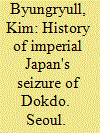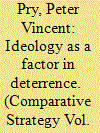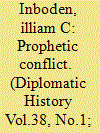| Srl | Item |
| 1 |
ID:
138848


|
|
|
|
|
| Publication |
Seoul, Northeast Asian History Foundation, 2006.
|
| Description |
198p.Pbk
|
| Standard Number |
978896187066593910
|
|
|
|
|
|
|
|
|
|
|
|
Copies: C:1/I:0,R:0,Q:0
Circulation
| Accession# | Call# | Current Location | Status | Policy | Location |
| 058235 | 952.031/BYU 058235 | Main | On Shelf | General | |
|
|
|
|
| 2 |
ID:
112860


|
|
|
|
|
| Publication |
2012.
|
| Summary/Abstract |
History is replete with examples of deterrence failure and war occurring unexpectedly, taking nations by surprise, because of failure to comprehend an adversary's ideology. The modern world has been shaped by failure to comprehend the ideologically driven aggression of Nazi Germany, Imperial Japan, Soviet communism, and Islamic jihadism. The Soviet "war scare" during NATO's nuclear exercise ABLE ARCHER-83 exemplifies how ideology could cause deterrence failure and even nuclear war. Understanding the ideology of potential adversaries must be part of any informed deterrence strategy. U.S. overconfidence in deterrence theory, which is itself an ideological belief system, could contribute to deterrence failure.
|
|
|
|
|
|
|
|
|
|
|
|
|
|
|
|
| 3 |
ID:
132008


|
|
|
|
|
| Publication |
2014.
|
| Summary/Abstract |
This article traces the development of Reinhold Niebuhr's growing alarm over the rise of Nazi Germany and Imperial Japan leading up to World War II, and his corresponding warnings to the United States and allied powers of the need to confront fascist aggression. The theme of the "prophetic" shaped Niebuhr's perception of the threat of fascism, both through his concern over the religious liberty of Christian and Jewish voices to bring prophetic judgments against totalitarian governments and through his predictions of the threat that fascist regimes posed to the international order. In the course of the 1930s Niebuhr also refined his doctrine of Christian realism, which both influenced yet differed from the evolution of realism as a theory of international relations. Niebuhr's development over this decade also marked his transition from the margins to the center of American intellectual and political life.
|
|
|
|
|
|
|
|
|
|
|
|
|
|
|
|